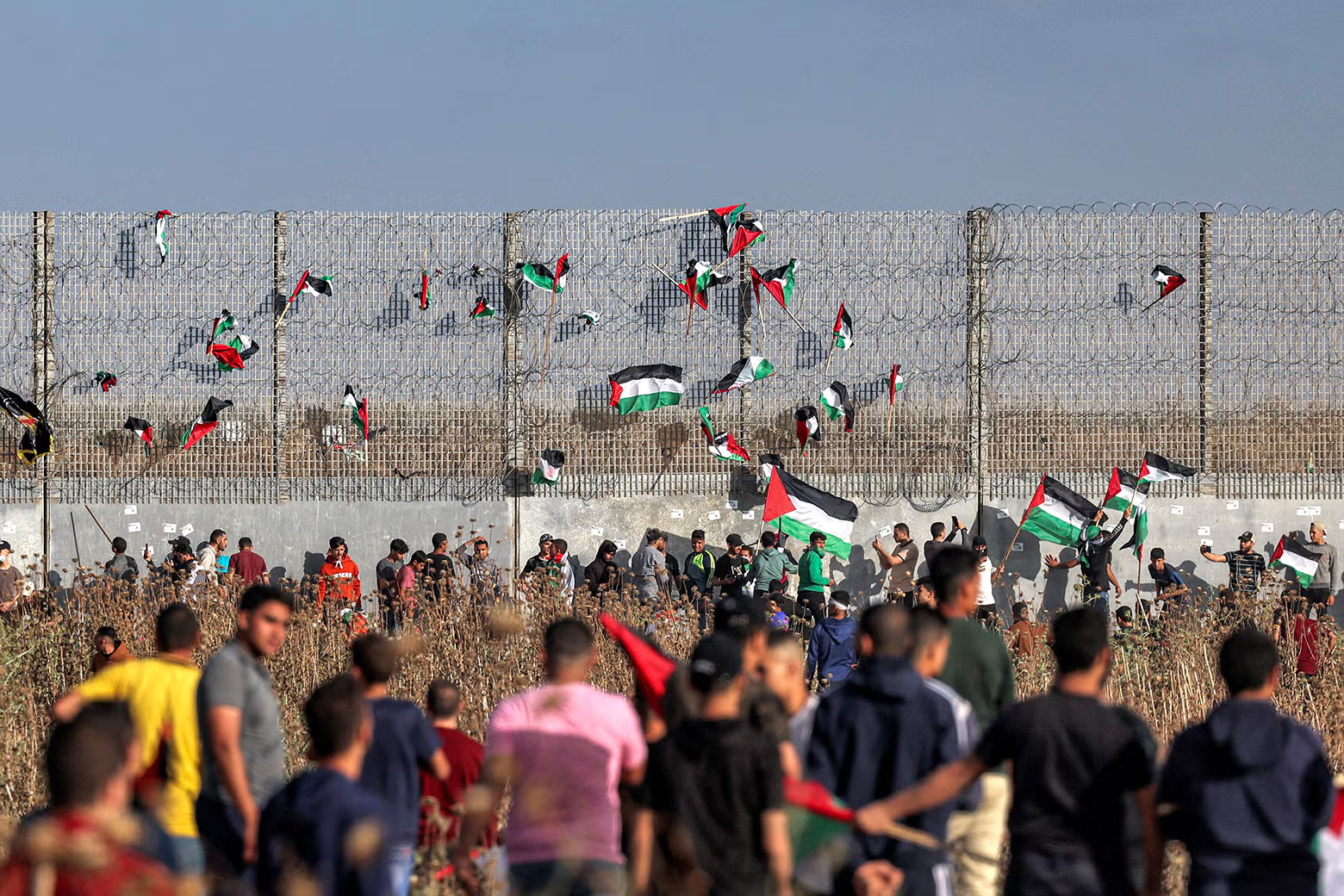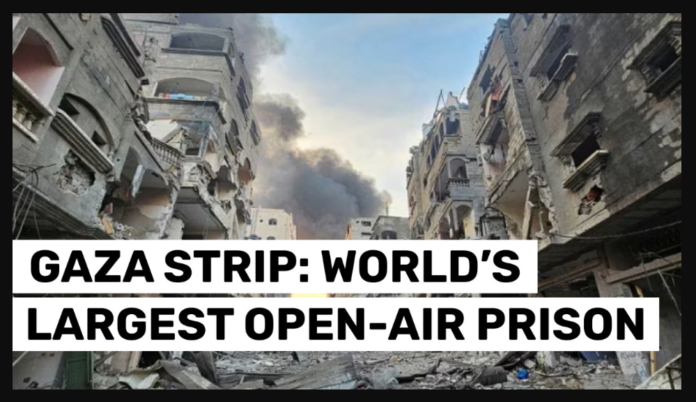The little peninsula known as Gaza is on the coast of the eastern Mediterranean and has the unsettling nickname “open-air prison.” This designation accurately captures the appalling circumstances, characterized by political unrest, bloodshed, and humanitarian emergencies, that its residents have endured for many years. We shall examine the major causes of Gaza’s poor position in this blog post as we dig into the intricate history and events that led to it.
Source : Connecticut Public Radio

The Geographic and Historical Background of Gaza
Measuring under 365 square kilometers, Gaza is a tiny coastal enclave that is home to among of the world’s densest populations. Its boundaries are shared by Egypt to the south, Israel to the east, and the Mediterranean Sea to the west. Its past is intricately linked to the larger Israeli-Palestinian conflict.
The 1948 Arab-Israeli War and Israel’s establishment
The Arab-Israeli struggle that followed the establishment of the state of Israel in 1948 is what gave rise to Gaza’s present predicament. The Palestinian refugee issue began when Gaza was placed under Egyptian rule during the 1948 Arab-Israeli conflict, when hundreds of thousands of Palestinians were forced to flee their homes or were driven out.
The Six-Day War of 1967
When Israel invaded Gaza during the Six-Day War in 1967, the situation there drastically changed. Since Israeli military authority over the Palestinian people in Gaza resulted from the occupation, it was a watershed moment. This has developed into an intricate control structure over time, including the construction of Israeli colonies in Gaza.
Israeli Blockade: Squeezing Gaza
The Israeli siege is one of the main causes of Gaza’s position as a “open-air prison”. The passage of persons and products into and out of Gaza is severely restricted by this embargo, which went into effect in 2007. The infrastructure, everyday living of Gazans, and the economy have all suffered greatly as a result of the embargo.

The Justification for the Blockade
Israel claims that the main justification for the siege is security-related. They contend that it is essential to stop the importation of supplies and weapons that Palestinian terrorist organizations, especially Hamas, who rule Gaza, would utilize for armed action. Critics counter that because the embargo affects everyone in Gaza, not only terrorists, it amounts to collective punishment.
Humanitarian Repercussions
The blockade’s effects on humanitarian issues are severe. It has resulted in a degenerating healthcare system, a scarcity of food and medication, and significant unemployment. The misery of the people living in Gaza has been made worse by their lack of access to power and clean water. Additionally, the embargo limits people’s freedom of movement, making it difficult for Gazans to travel for employment, education, or medical care.
The Gazan Economy
The siege has had a devastating effect on Gaza’s economy. Trade and mobility limitations have made it almost hard for enterprises to prosper. Because of the startlingly high unemployment rate, a large number of Gazans rely on humanitarian help to meet their basic requirements. Additionally, the embargo has stunted the expansion of the private sector, leaving Gaza’s economy highly dependent on foreign assistance.
The Function of Hamas
Gaza has been ruled by the Islamist political and military group Hamas since 2007. Though many in the world community consider Hamas to be a terrorist organization, a sizable section of Gaza’s population supports the political organization. To grasp Gaza’s present situation, one must grasp Hamas’s involvement in it.

Ascent to Power
Following their victory in the 2006 Palestinian parliamentary elections, Hamas took control of Gaza. But after winning, it was locked in a political impasse with the opposing Fatah party, which ruled the West Bank. This strain finally reached a breaking point in 2007, when Hamas violently seized control of Gaza.
Governance Difficulties
Hamas’s rule in Gaza has been characterized by both internal and foreign difficulties. The group has come under fire for its use of violence and rocket assaults against Israel in addition to its totalitarian leadership. Because of these acts, the people of Gaza are suffering more as a result of Israeli military measures.
Worldwide Reaction
The world community has been actively engaged in resolving the Gaza issue, sending aid and trying to mediate ceasefires and peace accords via a number of states and organizations. Nonetheless, a complete resolution to the predicament has yet to materialize.
Volunteer Aid
To lessen the suffering of its citizens, a number of foreign organizations, including the United Nations, have sent humanitarian supplies to Gaza. Although vital, humanitarian help can only take care of the population’s immediate needs; it does not address the root causes of the issue.
Cease-Firing Accords
Israel and Hamas have signed many cease-fire agreements throughout the years. These cease-fires, meantime, have not always been durable, with bloodshed frequently returning. The cycle of violence is maintained because the underlying reasons of the conflict are not addressed.
The Two-State Approach
The creation of a two-state solution, in which Israel and a future Palestinian state reside side by side, is the internationally recognized solution to the Israeli-Palestinian issue. But with the growth of Israeli settlements in the West Bank, Palestinian political splits, and changing regional dynamics, the likelihood of this solution has deteriorated over time.
In summary
The fact that Gaza has been called a “open-air prison” serves as a sobering reminder of the ongoing Israeli-Palestinian struggle. The grave situation in Gaza is a result of a number of factors, including the historical background, the Israeli embargo, Hamas’s participation, and the international reaction. Although providing humanitarian relief is essential for easing the current suffering, a long-term solution to the situation is still unattainable. In order to bring about a fair and enduring settlement in Gaza and the wider Israeli-Palestinian issue, there has to be a fresh dedication to negotiation, conversation, and compromise. In the absence of such initiatives, the people of Gaza would keep suffering under the shadow of a war that has lasted for many generations.





